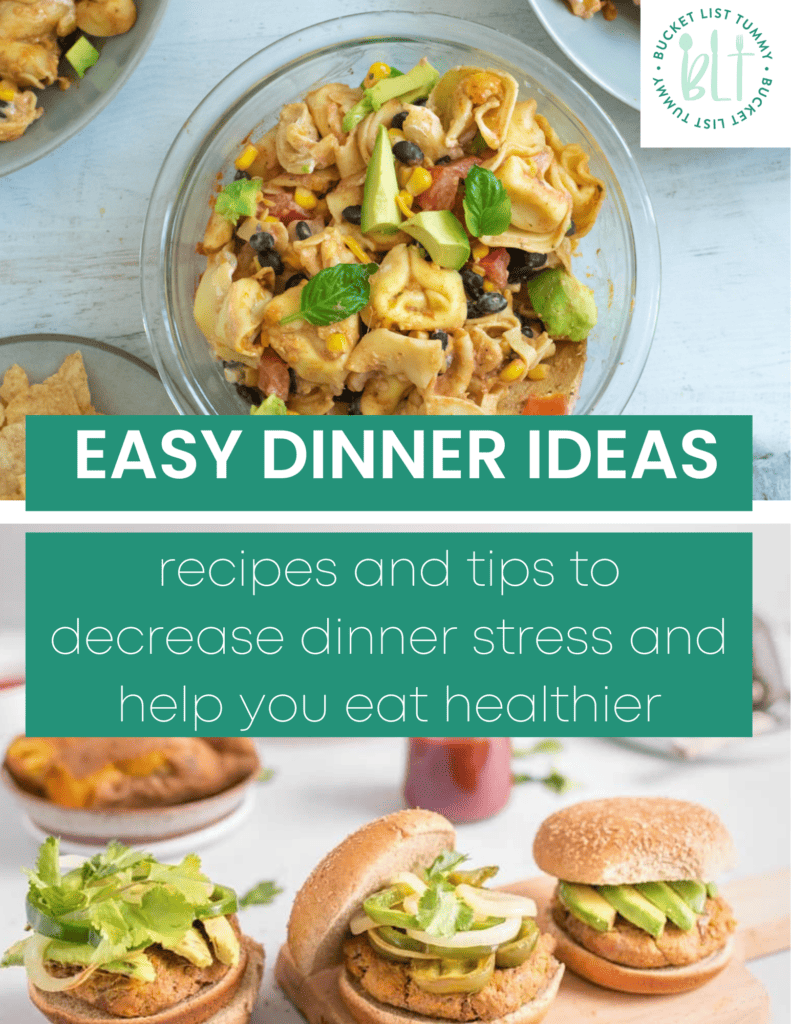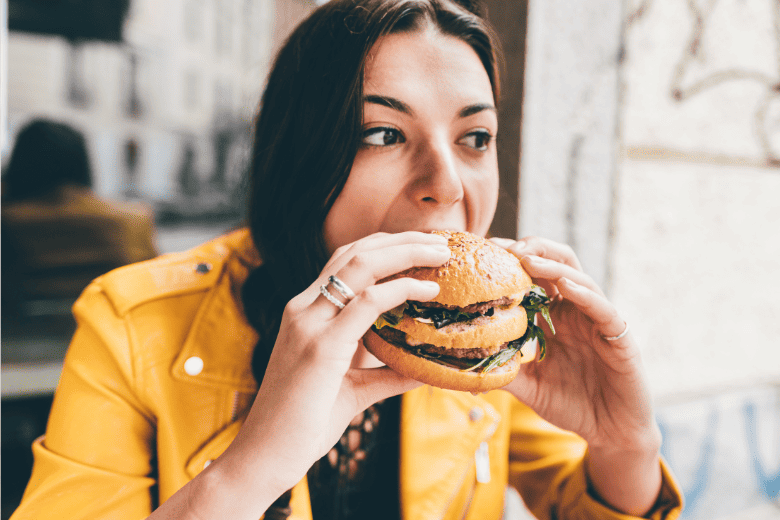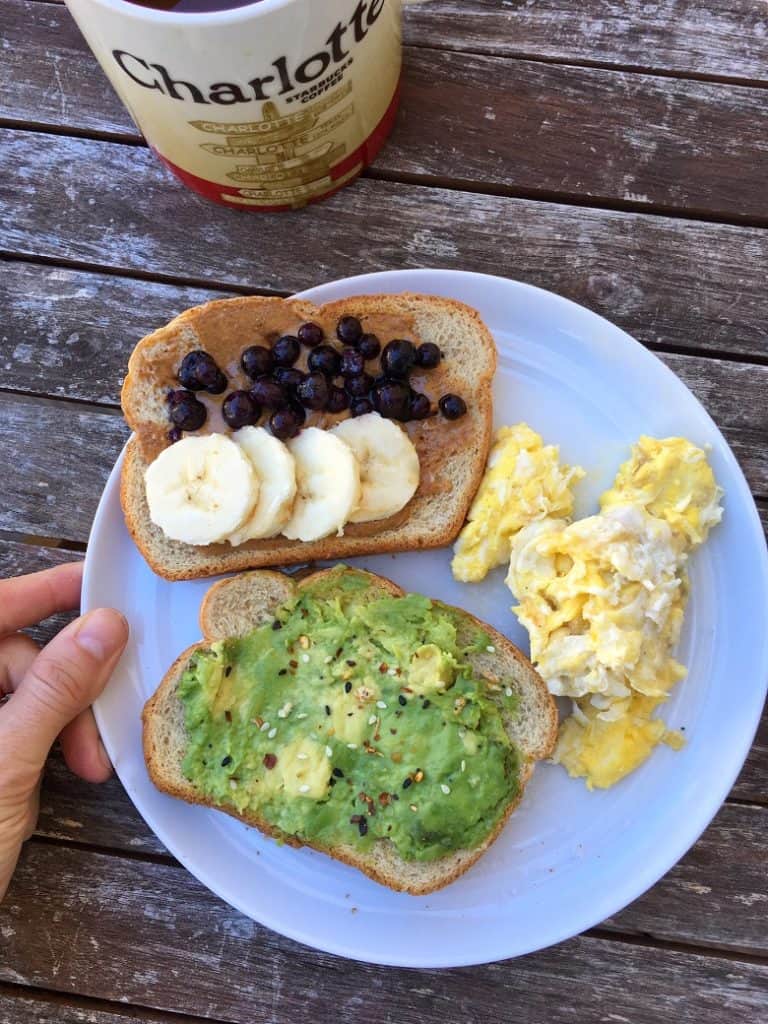Physical Hunger vs. Emotional Hunger
- August 15, 2023
- Last Updated: January 16, 2025
- 1 Comment
- Intuitive Eating
One of the 10 principles of intuitive eating is honoring your hunger. But are you having trouble determining why you are feeling hungry? It’s common while dieting to eat in response to difficult emotions. So how do you know the difference between physical hunger vs. emotional hunger? Read on to learn more.
As an Amazon Associate, I may earn from qualifying purchases. You can read more here about our Disclaimer and Privacy Page.
We eat for a multitude of reasons, some of which don’t involve actual physical hunger.
Boredom, stress, sadness, exhaustion, celebration, loneliness, to name a few.
Food is often the center of our celebrations and is a vital part of most cultures. It can’t be argued that eating gives us not only physical comfort, but emotional comfort too.
The problem with eating outside of physical hunger (eating in respones to emotions) is when food becomes your primary emotional coping skill.
After years of restriction and dieting, we can lose touch with our physical hunger cues. Plus, we know that most fad diets fail.
Grab Our Meal Prep Ebook to Finally Conquer Meal Prep in the Kitchen

The lines can blur between physical and emotional hunger.
When you learn about intuitive eating for beginners, you can start to figure out what your physical hunger feels like.
And how that may differ from other types of hunger – like practical hunger, planning hunger, and/or emotional hunger.
It’s true that differentiating emotional hunger vs. physical hunger isn’t always a black and white answer.

What is Emotional Hunger?
Emotional eating starts from an early age. I think it’s important to state that to normalize it.
When a baby cries, they are soothed by breastfeeding or a bottle of milk.
Food may be offered as a reward for good behavior or for accomplishing a task. All of these behaviors establish a strong connection between food and emotions.
Emotional hunger is simply the urge to eat in response to feelings and emotions.
You need or want something, and food is your answer.

For example, when you are feeling depressed after the loss of a loved one, you try to make yourself feel better by eating ice cream or peanut butter brownies.
Or you’ve had a hard day at work, so you feel entitled to french fries on your way home.
Rather than sitting with the feeling of complex emotions, food is chosen to numb it.
But, the important thing to remember here is that food rarely solves the problem.
Not only do you feel sad or upset, but you may also feel guilty after eating and uncomfortable fullness.

Emotional eating often leads to binge eating and poor body image, both of which take a toll on mental health.
You may be more likely to eat emotionally if you are heavily restricting your diet.
After restraining from foods you enjoy, extreme deprivation may leave you feeling desperate.
In addition, dieting requires that you ignore your hunger in an effort to reduce your food intake, a sure sign of an unhealthy relationship with food.
The whole process disconnects you from your body’s natural hunger cues.
What Does Emotional Hunger Feel Like?
Emotional hunger starts in the mind, so healing emotional hunger often looks like tackling the “why” behind the urges.
You aren’t necessarily physically hungry but you are seeking the comfort of food. You may notice your desire to eat starts with a specific emotion.
Emotional triggers to eat include:
- Seeking a reward. Whether you’ve passed a difficult exam or managed to grocery shop with your children without losing your sanity, you may feel like treating yourself to a favorite or forbidden food.
- Needing comfort. We often seek comfort foods when we are in need of a boost in mood, especially when we don’t regularly allow ourselves to eat them.
- Feeling bored or wanting to procrastinate. Ever find yourself opening up the fridge or pantry just because? We sometimes eat to fill the time—even if we don’t feel hungry.
- Anxiousness. Anxiety is an emotion you may want to dull. Food may be the way you try to distract yourself from anxious feelings.
- Celebrating something. Celebrations usually include food—birthdays, baby showers, and retirement parties usually have a meal or snacks to share. It is common to eat to celebrate an occasion instead of true physical hunger.
- Feeling sad or depressed. Food has the ability to make us feel better. Chocolate has a proven effect on mood.
- Experiencing overwhelm or stress. When we are overwhelmed, our health is often placed on the back burner. You aren’t making sure you are eating nourishing and satiating foods. Instead, you are in survival mode, barely getting by between meals.
- Loneliness. Sometimes people turn to food when they are feeling alone. Food may take the place of a friend—always there for you.
- Frustration. We all feel frustrated on occasion. You may try to avoid the feeling by turning to food.

Physical vs. Emotional Hunger
In contrast to emotional hunger, physical hunger is the biological need for fuel. Your body lets you know it needs food by hunger cues.
Although while dieting you may have viewed hunger in a negative light, hunger is actually a good thing. Our hunger helps us thrive.
Hunger is normally felt every 2-4 hours, depending on your activity levels, age, and what you last ate.
There are distractions and other things that make it difficult to feel our physical hunger cues, and further contributes to the confusion around head hunger vs real hunger.
Have you ever had an extremely busy day and realize that you forgot to eat?
Likewise, if you are under a lot of pressure and stress, you may not feel like eating at all.

Another example of this is when you may not feel hungry after a workout and hunger is suppressed due to the stress hormones that rise during exercise.
In short, differentiating real hunger vs emotional hunger requires being in tune with your body. Pay attention to your body to recognize what it’s telling you.
Differentiating real hunger vs. emotional hunger requires being in tune with your body.

Physical Signs of Hunger
Everyone feels physical hunger signs a bit differently.
While many people feel hunger in their stomachs first, not everybody has those sensations.
In fact, if you’ve spent years of dieting and ignoring your hunger cues, you may need to take time to (re)learn how your body experiences physical hunger.
Typically, you’ll know you are physically hungry when you have the following signs, signals or feelings:
- Rumbling stomach
- Empty feeling in your stomach
- Crabby or irritable (hangry)
- Foggy-headed
- Inability to focus
- Headache
- Lack of energy
- Sleepy
- Food seems more appealing
Physical Hunger vs. Emotional Hunger: How to Differentiate
To know whether you are feeling emotionally or physically hungry, take a time out.
- Where do you feel your hunger?
- Your body or your mind?
- Are you experiencing heavy emotions?
- Have you eaten lately?
- Are you honoring your hunger or do you feel guilty about it?
If your body is well-nourished, you will be less likely to turn to food when dealing with your emotions.
It is perfectly normal for an intuitive eater to eat according to emotions on occasion.

You may still celebrate with food or rummage through your snack cabinet when you should be tackling your to-do list.
That’s okay.
It can take a while to recognize your body’s cues and become mindful of your hunger.
Be patient with yourself.
Throughout your intuitive eating journey you’ll be learning new things about your physical body and the thoughts you have about food.
If you want more information, check out my hunger ebook on hunger and intuitive eating.
References:
- Shriver LH, Dollar JM, Calkins SD, Keane SP, Shanahan L, Wideman L. Emotional Eating in Adolescence: Effects of Emotion Regulation, Weight Status and Negative Body Image. Nutrients. 2020;13(1):79. Published 2020 Dec 29. doi:10.3390/nu13010079
- van Strien T. Causes of Emotional Eating and Matched Treatment of Obesity. Curr Diab Rep. 2018;18(6):35. Published 2018 Apr 25. doi:10.1007/s11892-018-1000-x
- Tuenter E, Foubert K, Pieters L. Mood Components in Cocoa and Chocolate: The Mood Pyramid. Planta Med. 2018;84(12-13):839-844. doi:10.1055/a-0588-5534
- Montagrin A, Martins-Klein B, Sander D, Mather M. Effects of hunger on emotional arousal responses and attention/memory biases. Emotion. 2021;21(1):148-158. doi:10.1037/emo0000680
Explore More Recipes
Intuitive EatingSupport Bucket List Tummy








Like This Content?
Support Bucket List Tummy